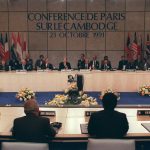We’ll always have Paris

Amid the winding-down of the Cold War in early December 1987, Prime Minister Hun Sen and Prince Norodom Sihanouk met in the quiet northern French village of Fère-en-Tardenois for their first talks on ending Cambodia’s intractable civil war. It was an overture that opened the road to the 1991 Paris Peace Agreement – signed 25 years ago on Sunday – and followed two months after Hun Sen’s People’s Republic of Kampuchea regime had publicly outlined the details of the pact it sought. Sihanouk would return to Phnom Penh, the PRK suggested, and take “a high place in the leading state organ” of the regime, while the Vietnamese military battling to overcome Sihanouk’s resistance forces would withdraw and let the PRK run elections. It was the first acknowledgement that Hun Sen’s pariah republic needed the legitimacy that only the return of the popular former king could bring. “They have come to understand that if Cambodia wants to recover its full independence, the country needs Sihanouk,” wrote Jacques Bekaert, the Bangkok Post’s correspondent in Cambodia, after the meeting, while noting the terms would never be accepted.

